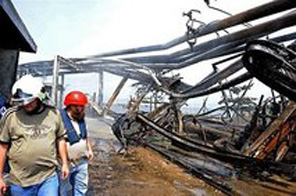Nigerian rebels take 'oil war' into Lagos
LAGOS: Nigerian rebels took their 'oil war' with the government into Lagos, killing at least five people in their first ever attack on Africa's biggest city on the eve of the release of their leader from jail.
The Movement for the Emancipation of the Niger Delta (MEND) claimed the overnight attack on the main Atlas Cove oil depot Cove which reverberated across the city of 16 million people.
It came hours before one of MEND's top leaders, Henry Okah, was freed by a court which dropped treason charges against him as part of an amnesty deal.
"All the charges against him have been withdrawn, he is a free man," Okah's lawyer Femi Falana told AFP.
Okah told reporters he was happy to be free before being whisked away by officials to finalise release formalities.
Justice Minister Michael Aondoakaa was in court in the central city of Jos to withdraw the charges against the MEND leader, who had been held for 20 months for gun-running. His release had been one of the rebels' main demands.
"The federal government has dropped all the charges against Okah," the minister said.
Okah is the most high-profile militant to take advantage of an unconditional amnesty announced last month by President Umaru Yar'Adua for rebels in the Niger Delta.
The amnesty offer, an attempt to blunt worsening militant violence directed at oil companies, is valid until October 4.
MEND said it was "grateful to God that the trumped-up charges" against Okah had finally been dropped.
"MEND considers this release as a step towards genuine peace and prosperity if Nigeria is open to frank talks and deal sincerely with the root issues once and for all," it said in a statement.
The three-year MEND campaign has badly hit much needed oil revenues.
London-based oil analyst Olivier Jakob said the latest audacious attack was a "symbolic escalation" of MEND's campaign, as it happened well outside its territory of the Niger Delta.
"Atlas Cove is a major product terminal and given that the inland refineries are not running due to the lack of crude supplies (pipeline attacks), an incident at Atlas Cove could have a serious impact on local product supplies." Mohammed Barkindo, the head of Nigeria's state oil firm, told reporters during a tour of the Atlas Cove jetty that although the facility handled 35 percent of Nigeria's oil refined oil imports, there were enough stocks to last until repairs were done.
A member of a private emergency service, Geofrey Boukoru, said the militants had exchanged fire with the navy at the facility on Lagos's Tarkwa Bay, before using dynamite to blow up 10 huge pipes.
"In all five bodies were burnt beyond recognition, and they were all workers," Boukoru told reporters at the Atlas Cove jetty following the powerful blast. But government and navy officials said three people had died, one of them a member of the navy.
It took rescue workers around six hours to extinguish the fires.
"We encountered some slight resistance from the Nigerian navy guarding the facility but they were easily overpowered," said MEND.
Violence in the southern region of the world's eight largest oil exporter has cut output by more than 30 percent over the past three-and-a-half years.
Apart from attacks on oil installations in the Niger Delta, hundreds of oil workers -- foreign and local -- have been kidnapped.
The rebels launched their "oil war" in the swamps and creeks of oil-rich southern Nigeria in 2006, demanding that local people get a fairer share of the oil wealth.
But Sunday night's attack marked the first time their campaign had reached Lagos.
The state-run Nigerian National Petroleum Corporation (NNPC) has painted a grim picture of the fallout of the violence.
It said monthly oil revenue this year dropped to around one billion dollars from an average of 2.2 billion dollars in 2008.
Nigeria, Africa's most populous country, relies on oil for more than 90 percent of its export earnings. Its foreign reserves have plummeted by about 10 billion dollars in six months to 43.19 billion dollars in early June.






